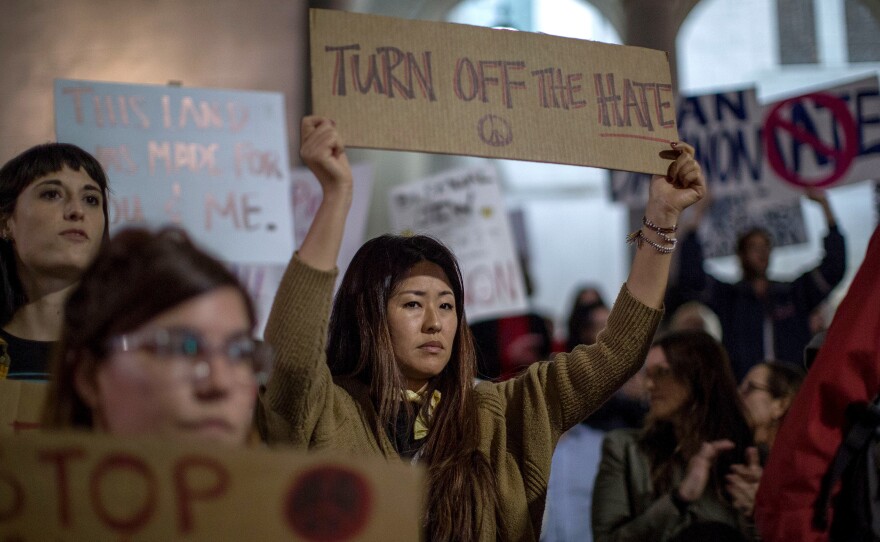Meeting with The New York Times today, Donald Trump said the words many have been waiting for: "I disavow and condemn them."
He was answering a question about a gathering of the so-called alt-right a few days ago in Washington. The views of the self-described alt-right are widely seen as anti-Semitic and white supremacist.
A video taken at the conference by The Atlantic for a documentary out next month shows a speaker calling out "Hail Trump! Hail our people! Hail victory!" The crowd responds with cheers; some, with Nazi salutes.
This kind of behavior doesn't shock Deborah Lauter, senior vice president for policy and programs with the Anti-Defamation League.
"We've been monitoring these groups for decades," she tells NPR's Kelly McEvers. "But it is shocking to most people — (it) should be — and, in a way it's good for people to understand that it still exists, and that, unfortunately, it's growing."
Interview Highlights
On Donald Trump's disavowal of the alt-right
I was very pleased to hear that he used the words "condemn" and "disavow" — we've been asking him to do that over the course of the campaign and post-election. ... I think he's gonna need to continue to do it. It's an important statement for him to make, and it's important for the white supremacists who are touting him as their new leader to hear that he is not in their camp.
On the uptick of harassment and hate speech since the election
That's probably our biggest concern. ... This mainstreaming of hate speech is something we never really thought we'd see in this country again. ...
It's a definite, dramatic increase. It's manifesting as vandalism — a lot of swastikas, we're seeing — but it's also manifesting in diverse schools where some children, particularly immigrant children, or families of immigrants, are being taunted and bullied.
So the key is for people to continue to report those incidents, because we can't address it unless we know about them and can provide support. ...
It's a coarsening of our democracy, and it makes people who live here feel fear and insecurity. And that's just not what our country is about.
On whether recent incidents mark a turning point
I hope it's not a turning point. I would probably refer to it more as a wake-up call. The Anti-Defamation League has always said we need to fight hate in a comprehensive way, and now that it's been exposed so graphically and in the public's face, I think what we need is for people to really heed that wake-up call and stand up to the hate.
On what people who oppose the alt-right can do
It's imperative that good people speak out. So if they do witness someone who is being harassed or bullied — because they have a hijab on, for example — they need to be an ally, they need to step forward and say this is not acceptable. For people who see incidents in their community — whether it's a swastika or other bigoted incident — come together as a community and stand up and say our neighborhood will not tolerate this.
There are things individuals can do, communities can do, but it's essential that we not be passive about it. And I think people who are doing this have a sense of pride that they are being part of something bigger and that they're helping this country return to normalcy of civility.
Copyright 2016 NPR. To see more, visit http://www.npr.org/.






